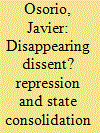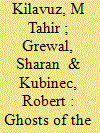| Srl | Item |
| 1 |
ID:
158215


|
|
|
|
|
| Summary/Abstract |
Does violent repression strengthen the state? In this article we explore the legacies of repression by the Mexican government on subsequent patterns of state consolidation. We investigate how a particular form of state repression, forced disappearances of alleged leftist dissidents during the ‘Dirty War’, had path-dependent consequences for different dimensions of state capacity nearly 50 years later. To do so, we rely on data gathered from suppressed Mexican human rights reports of forced disappearances which, to our knowledge, have not been analyzed by social scientists before. Controlling for a rich set of pre-disappearances covariates we find that forced disappearances are positively correlated with contemporary measures of fiscal, territorial, and bureaucratic capacity. However, historical forced disappearances do not help the state to provide security, to consolidate its monopoly over the use of force, or to provide welfare-related public goods in the long run. Moreover, disappearances are negatively correlated with various measures of trust in the government. Forced disappearances committed by the state appear to have long-term yet heterogeneous effects on state consolidation.
|
|
|
|
|
|
|
|
|
|
|
|
|
|
|
|
| 2 |
ID:
190017


|
|
|
|
|
| Summary/Abstract |
Episodes of mass political violence, such as genocide and civil war, have been thought to both encourage and discourage future political mobilization. We square these competing hypotheses by disaggregating between protest onset and resilience. We argue that exposure to mass violence decades ago should on average decrease protest onset, by heightening fears of repression and retribution. However, conditional on protesting, prior exposure to violence should increase protest longevity, by generating greater political grievances that fuel commitment to the cause. We find evidence of both effects in Algeria during the 2019–20 Hirak protests that toppled President Abdelaziz Bouteflika. Pairing an original dataset on massacres during the 1990s civil war with a rolling online survey of 18,000 Algerians in 2019–20, we find that areas exposed to greater violence in the 1990s had on average fewer, but more committed, protesters in 2019–20.
|
|
|
|
|
|
|
|
|
|
|
|
|
|
|
|